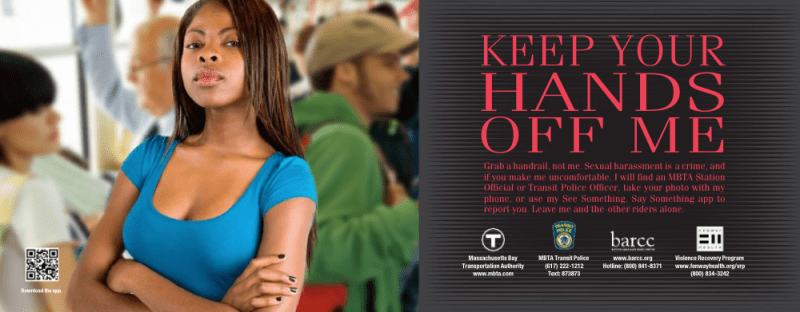As the #MeToo campaign draws attention to the pervasiveness of aggression and assault targeting women, Portland State University Planning Professor Jennifer Dill has been giving some thought to how sexual harassment affects the way women travel.
A recent piece by Martine Powers in the Washington Post reviewed the ample evidence that sexual harassment remains alarmingly common on transit. Riffing off that story, Portland State University professor Jennifer Dill writes at her blog about how women are harassed when traveling in public in any way -- be it walking, biking, riding transit, or even flying.
Despite widespread recognition of the problem, transit agencies have done surprisingly little to address women's safety, Dill writes:
The Post story highlighted the work of Anastasia Loukaitou-Sideris from UCLA. She has done several studies on transit crime and harassment, including How to Ease Women’s Fear of Transportation Environments: Case Studies and Best Practices. She and her research team surveyed transit operators throughout the U.S., with 131 agencies responding. This finding was particularly disappointing: “While two-thirds of the respondents (67%) indicated that female passengers have distinct safety and security needs, only about one-third (35%) believed that transit agencies should put into place specific safety and security programs for them” (p. 30). The reasons given for not putting specific programs in place fell into two categories. The first was that the agencies were treating everyone equally, regardless of gender. “The second argument was that women are no more vulnerable than men and do not have special safety and security needs.” Really? I don’t have data on this, but I suspect that more women than men have been exposed to sex organs while on transit.
Moreover, at the time of the survey (2006), only three of the 131 agencies had programs in place that distinctly addressed women’s safety and security needs. The report concludes that they found “a serious mismatch between the existing safety and security practices of transit operators and the needs and desires of women passengers” (p. 50). In the Post article, Loukaitou-Sideris encouraged systems for women to report harassment or assault on transit. Some seem to be following that advice. A story linked by the Post described DC Metro’s education efforts, including ads on where to call or text with a complaint. That’s a good start, because the same story stated that that 21% of people surveyed had experienced sexual harassment on public transit in Washington DC. Los Angeles’ Metro launched a campaign called “It’s Off Limits” that includes a 24/7 hotline. A 2015 survey of LA Metro riders found that 21% of train riders and 18% of bus riders had experienced any form of sexual harassment in the past six months, including 10% that had experienced indecent exposure on trains and 7% unwanted touching, groping or fondling. Mexico City’s transit system experimented with an anatomically correct subway seat to highlight the problem of sexual harassment on transit. The photo I used for this post is from an ad on BC Transit in Vancouver Canada. Unfortunately, while some agencies are being proactive, there are still examples, like this, of women reporting about other riders and transit drivers being unhelpful. In her story, the driver replied “You’re a pretty girl, what do you expect?” and several men on Twitter replied with equally or more vile responses.
More recommended reading today: Systemic Failure reports that taxpayers in Anaheim paid $108 million for a parking garage, but Disneyland gets to keep all the profits. And Human Transit considers signs that a building boom in Portland might be lowering housing prices.






